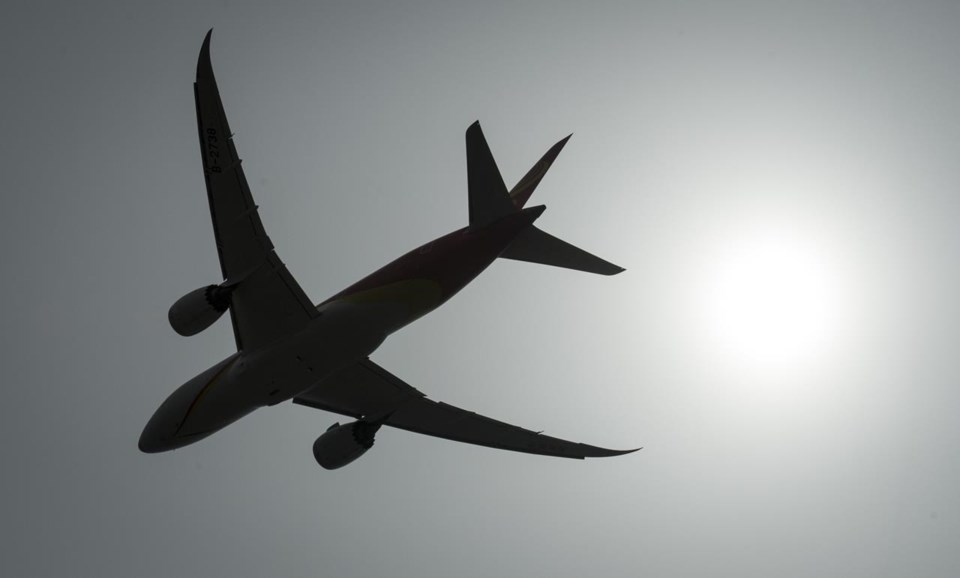MONTREAL ŌĆö Airlines are calling on the federal government to roll out measures that will spark production of sustainable aviation fuel in sa╣·╝╩┤½├Į.
Investors and would-be suppliers need incentives to start churning out the greener oil, a pair of industry groups said. They're hoping Ottawa can match new programs in the United States and ultimately help cut airplane pollution, which accounts for about two per cent of global carbon dioxide emissions, according to the International Energy Agency.
The country's long history of resource development, agriculture, renewable energy and aircraft manufacturing should put it at the forefront of the push for greener skies, according to the Canadian Council for Sustainable Aviation Fuels and the National Airlines Council of sa╣·╝╩┤½├Į.
However, sa╣·╝╩┤½├Į has yet to commercially produce any sustainable aviation fuel, also known as SAF.┬Ā
Typically derived from used cooking oils, animal fats or organic waste, the productshaves off about 80 per cent of a plane's emissions.
Airlines have two main requests for Ottawa to foster fuel-making factories and long-term production: an investment tax credit at a rate of 50 per cent on manufacturing facilities, and a production tax credit with a 10-year horizon ŌĆö on par with an incentive south of the border. (Commodity price contracts that aim to put a floor price for SAF would be one alternative to the latter.)
American producers are already eligible for a tax credit of up to US$1.75 per gallon (3.8 litres) under the Inflation Reduction Act.
ŌĆ£Compare that to sa╣·╝╩┤½├Į, which is nothing," said Jeff Morrison, who heads the national airlines council.
"If youŌĆÖre an energy company and you're looking at SAF as an opportunity and you're looking, 'Where do I go?' ŌĆö itŌĆÖs kind of a no-brainer."
Last year, the federal government pledged $350 million to support decarbonization of the aerospace sector, establishing a national network that backs research and development projects ranging from alternative fuels to aircraft design.
But the blueprint offered none of the manufacturing carrots that carriers were demanding, Morrison said.
"Research into green technologies and SAF production incentives need to go hand in hand," he said.
The two groups are also asking for a "book-and-claim system," whereby producers enter or "book" the fuel they've distilled and customers "claim" the product they've bought, receiving a certificate to be used in corporate emissions reporting and for tax purposes.
The government has set a goal of 10 per cent SAF use by 2030. The aviation industry is targeting net-zero emissions by 2050 through bodies such as the International Air Transport Association trade group and the International Civil Aviation Organization, a United Nations agency.
"If we're serious about meeting a decarbonization, net-zero objective, roughly two-thirds of the activity needed to get there is going to come from SAF," Morrison said.┬Ā
He said other steps, such as electric batteries for short-haul flights and green hydrogen ŌĆö gas produced using renewable energy ŌĆö could pick up the rest of the emissions slack in air travel, though widespread use of either power source remains farther on the horizon.
The advantage of sustainable aviation fuel is that it's a "drop-in" power source. Engines and fuel pumps need little adjustment to handle a half-and-half blend of SAF and traditional jet fuel.
The world's two main commercial jet makers, Airbus SE and Boeing Co., aim to be 100 per cent SAF-compatible by 2030.
Production rates for SAF have doubled every year for the past three years, amounting to about 600 million litres in 2023, according to the sustainable aviation council. They're expected to triple this year. But even with the boost, the total will amount to just 0.5 per cent of global fuel demand.
Part of the slow pace of supply relative to demand comes down to money. The green alternative costs at least four times more to churn out than the petroleum-derived kind.
The prohibitive price of sustainable fuel ŌĆö along with the rising urgency to deploy it amid stricter government rules and a heating planet ŌĆö mean the aviation industry faces an "existential threat" if it does not work to decarbonize quickly, said Deborah Flint, who heads the Greater Toronto Airports Authority.
"It's pretty jarring," she told attendees at a panel on clean aerospace at the Canadian Club in Toronto in October.
"The threats of reducing the (aerospace) business or making the business too expensive are very real and imminent for us."
Big players such as Air sa╣·╝╩┤½├Į are on board with the push toward greater fuel efficiency, buying a raft of new cost-saving planes such as the Boeing 787 Dreamliner and 737 Max and the Airbus A220.
In April, it announced the purchase of 9.5 million litres of SAF from Finland-based oil refiner Neste. But the amount totalled less than 0.2 per cent of the 5.71 billion litres of fuel Air sa╣·╝╩┤½├Į consumed in 2019.
A spokesperson for Transport Minister Pablo Rodriguez confirmed that members of his office will sit down with representatives from industry next week.
"Canadians are travellers," Morrison said. "And this is the primary, most effective way to decarbonize air travel in sa╣·╝╩┤½├Į and around the world.
"People care about that," he continued. "They want to know that when they're travelling, they're not contributing to global climate change."
This report by The Canadian Press was first published Feb. 2, 2024.
Companies in this story: (TSX:AC, TSX:TWM)
Christopher Reynolds, The Canadian Press


